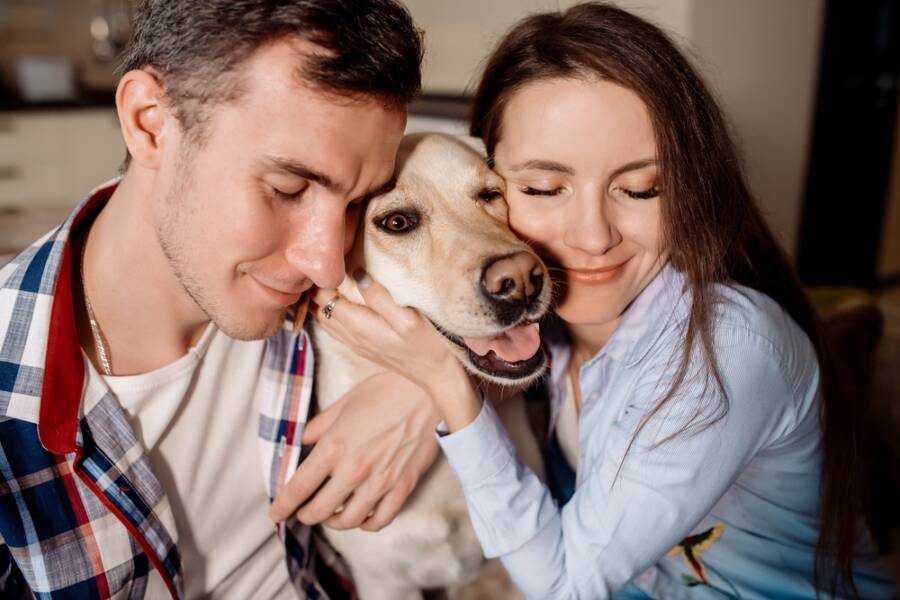Get ready to be amazed by the incredible things science discovered about dogs!
Dogs are awesome, sincere, and super affectionate. They absolutely love their owners, and simply being around them makes them happy. As a dog owner, I usually wonder what my fur baby thinks about me; “am I annoying it?” or “Is it really happy in my house?” or “Is the food I gave it tasty enough?”
While we may never know for sure what lies in their brain, with the help of science, we managed to get a bit more insight into the topic. As it turns out, there are more similarities between the brains of dogs and humans than previously believed. Spoiler alert: yes, they’re great, adorable, and super smart, as we thought.
These and a couple of other things science discovered about dogs will be revealed in the following lines of the article.

Dogs can recognize human emotions
Have you ever noticed that whenever you are sad or super excited, your dog feels it too? It’s been scientifically proven that dogs are the only animals that can tell the difference between neutral or happy human expressions, and they will react to people accordingly. They can also determine a person’s level of attention by observing their facial expressions.
For example, a dog will pay closer attention to you if they feel that you are gazing at them. However, if you hide or turn your head a bit, they can completely lose interest in you. If interactions between people were so easy, can you imagine? It would have been a far better and simpler life.
Dogs may understand our language
Every dog owner knows that when they tell their pup, “I love you,” they certainly understand it. Well, science agrees with this, and according to research, dogs’ brains process language in the same area as human brains.
A dog’s brain processes familiar phrases in its left hemisphere, while its right hemisphere processes the words’ emotional connotations. Our brains work the same way!
Of course, they don’t understand when you describe something or tell them about your day; they rather react and understand in their own words associated with actions. For example, “sit,” “come,” or “don’t do that.”
Dogs can dream too
This is one of the cutest things science discovered about dogs and is more interesting to read about it too. Dog owners can confirm that occasionally it appears as though their four-legged companion is dreaming while they are asleep. It certainly seems like a way when there’s an odd snarl or leg kick.
Because their brain design and sleeping patterns are similar to those of humans, scientists believe that while they sleep, dogs are dreaming.
Their brain is the size of a tangerine
You’ve probably heard that mental capacity and brain size are related. The brain of a dog is about the size of a tangerine. Even though it pales in comparison to the human brain, it is in the top 10 most intelligent in the animal kingdom.
Dogs recognize from afar their owners’s scent
Yes, we’ve seen a lot of dogs on TV that are trained to detect when people are in danger. Does it, however, actually function? It is more than just a work of fiction made for TV shows.
The sense of smell is said to be the most vital in a dog. They and their human counterparts use their noses’ 300 million+ olfactory receptors (as opposed to a person’s around six million) to comprehend the environment they live in.
A recent study looked at how well canines can distinguish between the smells of humans and dogs they know and those they don’t. It was discovered that dogs truly value people more than other dogs and nice scents. Their brain’s reward center is triggered by the smell of their human.
Are you thinking about spoiling your dog even more, but it is also a bit hard because they’re an aggressive chewer? Then try out the Benebone Wishbone Durable Dog Chew Toy made of real bacon that will keep the pup busy for a couple of hours. It’s available on Amazon at the price of $10.71.

Do you have a bad day? Your dog feels it too
There will never be another animal more empathetic than a dog. Period! Even if empathy is a complex human emotion, scientists discovered that dogs are feeling some sort of emotional contagion, which, instead of genuinely understanding and feeling for that individual, is more like a reaction to that person’s sentiments.
According to studies, dogs can soothe anxious individuals, both known and unknown, further demonstrating their altruistic and loving nature. The next time your dog tries to cheer you up when you’re feeling low, remember that while they might not understand, they can still empathize, which is wonderful.
The brain of a dog reacts enthusiastically to treats
Although you would believe that your dog’s excitement is just due to the rewards they receive for a job well done, they are really responding to more than just the food. Dogs’ brains are programmed to react favorably to treats and even the hand gestures used to show them appreciation. Isn’t that cute?
It’s funny but dog intelligence is similar to a toddler’s
I think we already established that dogs can learn a lot, and yes, they’re very smart. Dogs are capable of learning up to 165 words and even doing some math, according to studies. They are at the same level as a child between the ages of two and four in these areas. You will even see that dogs exhibit a desire to learn new things.
Because of this, engaging with your dog through puzzles and interactive activities is a terrific idea. Just as many dogs benefit from mental training as from physical exercise. If you can’t walk your dog today, attempt to interact with some enjoyable training exercises at home.
Dogs can experience depression
Scientists have demonstrated that dogs, like humans, can experience depression. This is the reason it is recommended to take your dog to the doctor when they are experiencing these kinds of problems.
Dogs can experience anxiety and depression, which can be treated with the right medications, behavioral changes, and environmental control.
Dogs are the only animals that look people in the eye
Dogs like making eye contact with people so much that they will gaze at them in the eyes to express their demands and feelings. And it’s interesting to also point out that dogs prefer to gaze into the eyes of humans than their dog parents.
You recognize the look if you’re a dog owner, because dogs often turn to their humans to communicate their needs, whether it is for food, attention, or to relieve themselves.
For this reason, it is believed that dogs can show affection more than other pets.
Dogs can experience brain freeze
I am sure you know the expression “brain freeze,” so I thought you might want to know that dogs can experience this too. Even though brain freeze is just short-term, your dog might not feel particularly happy about it.
There’s an interesting explanation for this sensation: when receptors in the lips sense cold, blood vessels dilate to attempt to warm the region, causing a brain freeze. When you feed your dog some chilly treats, try to limit how rapidly they consume them to prevent headaches.
Now that we know how dogs’s brains function, why not take a look at our brains too? Check out Interesting Things About the Brain Everybody Should Know About.















One Response
VERY INTERESTING, THANKS. I CAN RELATE TO MOST OF THE INFORMATION.